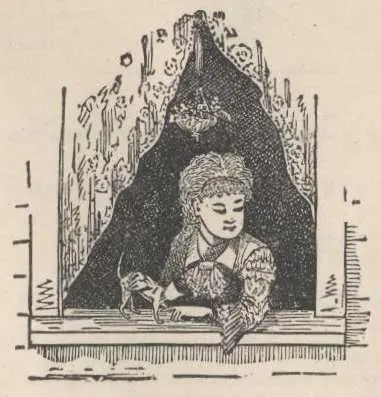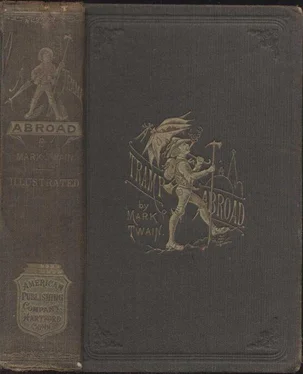Mark Twain - A Tramp Abroad
Здесь есть возможность читать онлайн «Mark Twain - A Tramp Abroad» весь текст электронной книги совершенно бесплатно (целиком полную версию без сокращений). В некоторых случаях можно слушать аудио, скачать через торрент в формате fb2 и присутствует краткое содержание. Жанр: Классическая проза, Юмористическая проза, на английском языке. Описание произведения, (предисловие) а так же отзывы посетителей доступны на портале библиотеки ЛибКат.
- Название:A Tramp Abroad
- Автор:
- Жанр:
- Год:неизвестен
- ISBN:нет данных
- Рейтинг книги:5 / 5. Голосов: 1
-
Избранное:Добавить в избранное
- Отзывы:
-
Ваша оценка:
- 100
- 1
- 2
- 3
- 4
- 5
A Tramp Abroad: краткое содержание, описание и аннотация
Предлагаем к чтению аннотацию, описание, краткое содержание или предисловие (зависит от того, что написал сам автор книги «A Tramp Abroad»). Если вы не нашли необходимую информацию о книге — напишите в комментариях, мы постараемся отыскать её.
A Tramp Abroad — читать онлайн бесплатно полную книгу (весь текст) целиком
Ниже представлен текст книги, разбитый по страницам. Система сохранения места последней прочитанной страницы, позволяет с удобством читать онлайн бесплатно книгу «A Tramp Abroad», без необходимости каждый раз заново искать на чём Вы остановились. Поставьте закладку, и сможете в любой момент перейти на страницу, на которой закончили чтение.
Интервал:
Закладка:
All the customs, all the laws, all the details, pertaining to the student duel are quaint and naive. The grave, precise, and courtly ceremony with which the thing is conducted, invests it with a sort of antique charm.
This dignity and these knightly graces suggest the tournament, not the prize-fight. The laws are as curious as they are strict. For instance, the duelist may step forward from the line he is placed upon, if he chooses, but never back of it. If he steps back of it, or even leans back, it is considered that he did it to avoid a blow or contrive an advantage; so he is dismissed from his corps in disgrace. It would seem natural to step from under a descending sword unconsciously, and against one's will and intent—yet this unconsciousness is not allowed. Again: if under the sudden anguish of a wound the receiver of it makes a grimace, he falls some degrees in the estimation of his fellows; his corps are ashamed of him: they call him "hare foot," which is the German equivalent for chicken-hearted.

CHAPTER VII
How Bismark Fought
Corps—laws and Usages—Volunteering to Fight—Coolness of the Wounded—Wounds Honorable—Newly bandaged Students around Heidelberg—Scarred Faces Abundant—A Badge of Honor—Prince Bismark as a Duelist—Statistics—Constant Sword Practice—Color of the Corps—Corps Etiquette
In addition to the corps laws, there are some corps usages which have the force of laws.
Perhaps the president of a corps notices that one of the membership who is no longer an exempt—that is a freshman—has remained a sophomore some little time without volunteering to fight; some day, the president, instead of calling for volunteers, will APPOINT this sophomore to measure swords with a student of another corps; he is free to decline—everybody says so—there is no compulsion. This is all true—but I have not heard of any student who DID decline; to decline and still remain in the corps would make him unpleasantly conspicuous, and properly so, since he knew, when he joined, that his main business, as a member, would be to fight. No, there is no law against declining—except the law of custom, which is confessedly stronger than written law, everywhere.

The ten men whose duels I had witnessed did not go away when their hurts were dressed, as I had supposed they would, but came back, one after another, as soon as they were free of the surgeon, and mingled with the assemblage in the dueling-room. The white-cap student who won the second fight witnessed the remaining three, and talked with us during the intermissions. He could not talk very well, because his opponent's sword had cut his under-lip in two, and then the surgeon had sewed it together and overlaid it with a profusion of white plaster patches; neither could he eat easily, still he contrived to accomplish a slow and troublesome luncheon while the last duel was preparing. The man who was the worst hurt of all played chess while waiting to see this engagement. A good part of his face was covered with patches and bandages, and all the rest of his head was covered and concealed by them.

It is said that the student likes to appear on the street and in other public places in this kind of array, and that this predilection often keeps him out when exposure to rain or sun is a positive danger for him. Newly bandaged students are a very common spectacle in the public gardens of Heidelberg. It is also said that the student is glad to get wounds in the face, because the scars they leave will show so well there; and it is also said that these face wounds are so prized that youths have even been known to pull them apart from time to time and put red wine in them to make them heal badly and leave as ugly a scar as possible. It does not look reasonable, but it is roundly asserted and maintained, nevertheless; I am sure of one thing—scars are plenty enough in Germany, among the young men; and very grim ones they are, too. They crisscross the face in angry red welts, and are permanent and ineffaceable.

Some of these scars are of a very strange and dreadful aspect; and the effect is striking when several such accent the milder ones, which form a city map on a man's face; they suggest the "burned district" then. We had often noticed that many of the students wore a colored silk band or ribbon diagonally across their breasts. It transpired that this signifies that the wearer has fought three duels in which a decision was reached—duels in which he either whipped or was whipped—for drawn battles do not count. [1] After a student has received his ribbon, he is "free"; he can cease from fighting, without reproach—except some one insult him; his president cannot appoint him to fight; he can volunteer if he wants to, or remain quiescent if he prefers to do so. Statistics show that he does NOT prefer to remain quiescent. They show that the duel has a singular fascination about it somewhere, for these free men, so far from resting upon the privilege of the badge, are always volunteering. A corps student told me it was of record that Prince Bismarck fought thirty-two of these duels in a single summer term when he was in college. So he fought twenty-nine after his badge had given him the right to retire from the field.
1. FROM MY DIARY.—Dined in a hotel a few miles up the Neckar, in a room whose walls were hung all over with framed portrait-groups of the Five Corps; some were recent, but many antedated photography, and were pictured in lithography—the dates ranged back to forty or fifty years ago. Nearly every individual wore the ribbon across his breast. In one portrait-group representing (as each of these pictures did) an entire Corps, I took pains to count the ribbons: there were twenty-seven members, and twenty-one of them wore that significant badge.
The statistics may be found to possess interest in several particulars. Two days in every week are devoted to dueling. The rule is rigid that there must be three duels on each of these days; there are generally more, but there cannot be fewer. There were six the day I was present; sometimes there are seven or eight. It is insisted that eight duels a week—four for each of the two days—is too low an average to draw a calculation from, but I will reckon from that basis, preferring an understatement to an overstatement of the case. This requires about four hundred and eighty or five hundred duelists a year—for in summer the college term is about three and a half months, and in winter it is four months and sometimes longer. Of the seven hundred and fifty students in the university at the time I am writing of, only eighty belonged to the five corps, and it is only these corps that do the dueling; occasionally other students borrow the arms and battleground of the five corps in order to settle a quarrel, but this does not happen every dueling-day. [2] Consequently eighty youths furnish the material for some two hundred and fifty duels a year. This average gives six fights a year to each of the eighty. This large work could not be accomplished if the badge-holders stood upon their privilege and ceased to volunteer.
Читать дальшеИнтервал:
Закладка:
Похожие книги на «A Tramp Abroad»
Представляем Вашему вниманию похожие книги на «A Tramp Abroad» списком для выбора. Мы отобрали схожую по названию и смыслу литературу в надежде предоставить читателям больше вариантов отыскать новые, интересные, ещё непрочитанные произведения.
Обсуждение, отзывы о книге «A Tramp Abroad» и просто собственные мнения читателей. Оставьте ваши комментарии, напишите, что Вы думаете о произведении, его смысле или главных героях. Укажите что конкретно понравилось, а что нет, и почему Вы так считаете.












